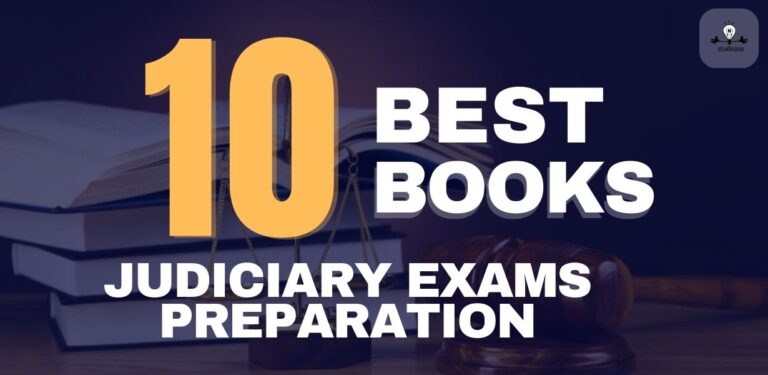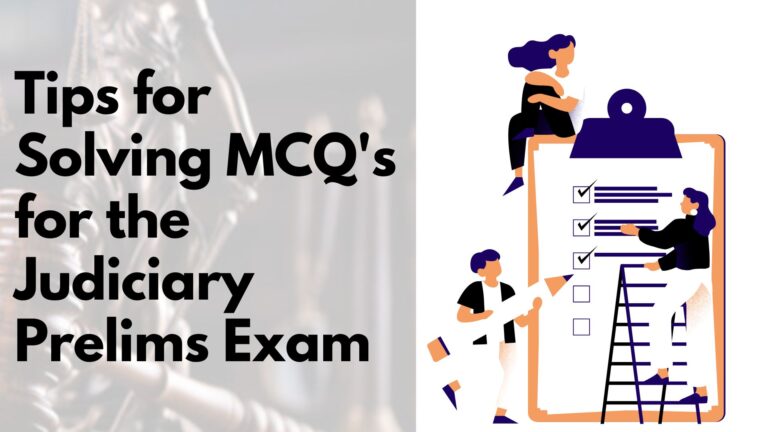How to Write Effective Essay for Judiciary Mains: Tips and Strategies

If you are an aspiring judge or lawyer, then you know the importance of writing an effective essay for the Judiciary Mains Exam. A strong introduction is crucial to grab the attention of the examiner and set the tone for your essay.
A strong start sets the tone for your essay and captures the reader’s attention. It should provide a brief overview of the topic and clearly state your thesis or argument. Your introduction should be concise and to the point, while also providing enough context for the reader to understand the topic.
In the following sections, I will provide tips on how to write a strong introduction and effectively answer essay questions in the Judiciary Mains Exam.
Page Contents
Significance of the Essay Writing Section
The essay writing section is a crucial part of the Judiciary Mains exam as it tests your ability to express your thoughts in a clear and concise manner. It is important to note that the essay writing section carries a significant weightage in the overall assessment of the exam.
The essay writing section is not just about writing a good essay, but it also tests your ability to organize your thoughts, present your arguments effectively, and use appropriate vocabulary and grammar.
The section is designed to evaluate your ability to critically analyze a given topic and present your arguments in a structured and logical manner.
To write an effective essay, it is important to understand the requirements of the essay writing section. You should be familiar with the format, structure, and content of the essay.
You should also be aware of the time limit and the word limit for the essay. It is important to practice writing essays within the given time limit and word limit to improve your writing skills.
Essay Writing Fundamentals

Writing an effective essay for Judiciary Mains requires a solid understanding of the fundamentals. In this section, I will cover the key elements you need to keep in mind while writing your essay.
Choosing the Right Topic
Choosing the right topic is crucial for the success of your essay. Make sure you select a topic that is relevant, interesting, and has enough material available for research. Your topic should also be within the word limit specified by the exam.
Structuring Your Essay
The structure of your essay plays a critical role in conveying your ideas clearly and effectively. Make sure you use a clear and consistent structure throughout your essay. Your essay should have an introduction, body paragraphs, and a conclusion.
Crafting a Strong Introduction
Your introduction should grab the reader’s attention and provide a clear overview of the topic and your argument.
Make sure you use a clear and concise language that is easy to understand. Your introduction should also provide a roadmap for your essay.
Developing the Body of the Essay
The body of your essay should be well-structured and organized. Each paragraph should focus on a single idea and provide evidence to support it.
Make sure you use clear and concise language and avoid repetition. Use proper formations to convey information effectively.
Incorporating Relevant Laws and Case Laws
Incorporating relevant laws and case laws is critical for your essay’s success. Make sure you use reliable sources and provide accurate information as the topic demands.
As per the topic, can also use lists to present the information in a clear and concise manner.
Analyzing Legal Issues and Evidence
Analyzing legal issues and evidence requires a clear understanding of the facts and relevant laws. Make sure you use a logical and systematic approach to analyze the evidence and provide a clear and concise conclusion.
Concluding Effectively
Your conclusion should summarize your argument and provide a clear and concise statement of your position.
Make sure you use a clear and concise language and avoid introducing new ideas. Your conclusion should leave a lasting impression on the examiner.
Advanced Writing Techniques

Enhancing Language and Vocabulary
To write an effective essay for Judiciary Mains, it is important to have a strong command of language and vocabulary. Using precise and clear language can help you convey your ideas more effectively.
To enhance your language and vocabulary, you can:
- Read extensively: Reading books, articles, and other materials can help you expand your vocabulary and improve your writing skills.
- Use a thesaurus: A thesaurus can help you find synonyms and antonyms for words, which can help you vary your language and avoid repetition.
- Practice writing: The more you write, the more comfortable you will become with using different words and phrases.
Utilizing Legal Language and Terminology
Judiciary Mains requires you to have a good understanding of legal language and terminology.
Using legal language and terminology can help you demonstrate your knowledge and understanding of the law. To utilize legal language and terminology effectively, you can:
- Familiarize yourself with legal terms: Make sure you understand the meaning of legal terms and how they are used in context.
- Use legal language appropriately: Use legal language and terminology only when it is necessary and appropriate. Avoid using legal jargon unnecessarily.
- Be precise and accurate: When using legal language and terminology, make sure you are precise and accurate in your use of language.
Presenting Arguments with Clarity and Precision
To write an effective essay for Judiciary Mains, it is important to present your arguments with clarity and precision.
This means that you should:
- Use clear and concise language: Avoid using complex or convoluted language that may confuse the reader.
- Be logical and coherent: Make sure your arguments are logical and coherent, and that they flow logically from one point to the next.
- Use Evidence to support your arguments: Use evidence to support your arguments and make sure your evidence is relevant and credible.
Editing and Proofreading Strategies

When it comes to writing an effective essay for Judiciary Mains, editing and proofreading are crucial steps that should never be overlooked.
Here are some strategies that can help you improve the quality of your essay:
Identifying Common Grammatical Errors
One of the most important aspects of proofreading is identifying and correcting common grammatical errors.
Editing and proofreading plays a crucial role in identifying and correcting common grammatical errors. This involves carefully reviewing written content to ensure that it adheres to the rules of grammar and punctuation.
Common grammatical errors include subject-verb agreement, improper use of punctuation marks, incorrect verb tense.
By carefully scrutinizing the text, thereby enhances clarity and coherence of the writing. Additionally, ensure that the language used is appropriate for the intended audience and purpose of the document.
Improving Style and Consistency
Another key aspect is improving the style and consistency of your writing. This includes making sure that your writing is clear, concise, and easy to understand.
To achieve this, consider using transitional words and phrases, avoiding technical terms.
Balancing Perspective on Sensitive Topics
When writing about sensitive topics such as politics, religion, or social issues, it is important to balance different perspectives and avoid bias.
To achieve this, consider using quotes from experts or credible sources, acknowledging counterarguments, and presenting evidence to support your claims.
Final Review and Polish
Make sure to give your essay a final review and polish. This includes checking for spelling errors, formatting inconsistencies, and ensuring that your essay follows the guidelines and requirements set forth by the Judiciary Mains exam.
Preparation and Practice

To write an effective essay for Judiciary Mains, preparation and practice are key. Here are some tips to help you prepare and practice effectively.
Answer Writing Practice
One of the most important things you can do to prepare for Judiciary Mains is to practice writing answers. This will help you become familiar with the format of the exam and the types of questions you will be asked.
Start by practicing with past papers and sample questions. This will help you get a feel for the types of questions that are likely to be asked and the format of the exam.
When you practice writing answers, make sure you focus on clarity and conciseness. Your answers should be well-structured and easy to read. Use headings and bullet points to help organize your thoughts and make your answers more readable.
Time Management and Organization
Time management and organization are crucial when it comes to writing effective essays for Judiciary Mains.
This will help you avoid running out of time and missing important questions.
To stay organized, create a study schedule and stick to it. Make sure you set aside time each day for studying and practicing. Use a planner or calendar to help you stay on track.
Mock Tests and Feedback
Mock tests and feedback are essential for effective preparation for Judiciary Mains. Mock tests will help you get familiar with the format of the exam and the types of questions you will be asked.
They will also help you identify your strengths and weaknesses.
Make sure you get feedback on your mock tests. This will help you identify areas where you need to improve and develop a plan for improvement.
The Role of Language Proficiency
As a Judiciary Mains candidate, your language proficiency plays a crucial role in determining the quality of your essay. It is essential to communicate your ideas effectively and coherently to the examiner.
Mastering Legal Jargon and Phrasing
Legal language can be complex and difficult to understand for those not familiar with it. Therefore, you must master legal jargon and phrasing to communicate your ideas clearly and concisely.
Using simple and clear language is crucial to avoid confusion and ensure that the reader understands your arguments.
One way to master legal jargon and phrasing is to read legal documents and judgments regularly. This will help you understand the language used in legal contexts and improve your vocabulary.
Effective Use of Language in Legal Contexts
Your essay should be well-structured and coherent, with each paragraph and sentence contributing to the overall argument.
Using appropriate vocabulary and sentence structures is essential to convey your ideas clearly and effectively. Avoid using overly complex language or sentence structures that may confuse.
Instead, use simple and clear language to ensure that your arguments are easy to understand.
Additional Considerations for Judiciary Aspirants

If you are aspiring to become a judge or a judicial officer, writing an effective essay for Judiciary Mains is crucial. Here are some additional considerations that you should keep in mind to enhance your chances of success.
Research and Analyze
To write an effective essay, you need to have a deep understanding of the subject matter.
Conduct extensive research and analyze the topic from various perspectives. Use reliable sources and cite them properly to support your arguments. This will demonstrate your knowledge and critical thinking skills to the examiner.
Structure your Essay
A well-structured essay is easier to read and understand.
Use headings, subheadings, and points to organize your thoughts and ideas. This will help you present your arguments in a clear and concise manner.
Make sure that your essay has an introduction, body, and conclusion, and that each section flows logically.
Follow Instructions
Make sure that you read and follow the instructions carefully.
Pay attention to the word limit, formatting guidelines, and any other specific requirements. This will show that you are detail-oriented and can follow instructions accurately.
Conclusion

In conclusion, writing an effective essay for Judiciary Mains requires careful planning, research, and organization. It is important to understand the requirements of the exam and to practice writing essays under timed conditions.
To write a successful essay, you should begin by analyzing the prompt and identifying the key issues.
You should then develop a clear thesis statement and organize your essay around supporting arguments and evidence. Use relevant examples and case studies to illustrate your points and make sure to address any counterarguments.
Remember to structure your essay with a clear introduction, body, and conclusion.
Use headings and subheadings to guide the reader and make your essay easy to follow. Use clear and concise language, and avoid using jargon or technical terms that may be unfamiliar to the reader.
Finally, make sure to proofread your essay carefully.
A well-written and well-organized essay will demonstrate your knowledge and understanding of the subject matter and will help you to achieve a high score on the Judiciary Mains exam.







